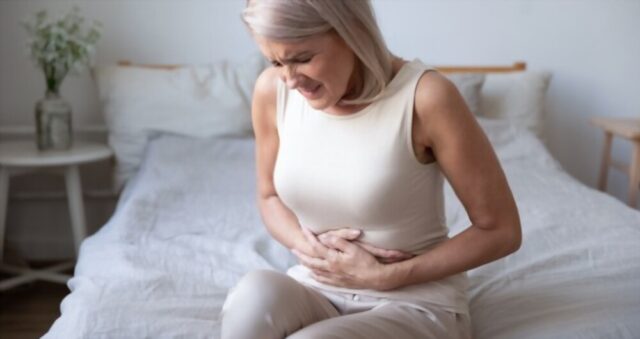As women, we tend to experience a great many menopause digestive issues. This is because our gut houses so many oestrogen, and other hormone, receptors. Before we get into the specifics of menopause and the gut, however, it’s important we understand the digestive process.
Chew it to death
Arguably, the most important aspect of healthy digestion is chewing our food well. Within the first bite or two, we release saliva containing amylase. This enzyme breaks down starches so keeping food in the mouth for longer gives these enzymes time to work. The process of chewing food also increases its surface area. This is a vital side-effect because when we swallow and take food down the oesophagus into the stomach, we release hydrochloric acid (HCL, or stomach acid) to aid with two specific tasks. The first is to neutralise any pathogens that may have been taken in with the food. Examples are fungi, viruses, bacteria, and parasites. The second is to help with absorption of vitamin B12, iron, calcium and protein. The greater the surface area of food, the more effective HCL is.
Chewing thoroughly also gives your gallbladder time to release bile. When you slow the process of eating down, you allow the brain to signal satisfaction earlier in the meal too. This reduces overeating and is key when eating foods containing a lot of fat.
Think about what you think about
Being mindful as we eat can also help slow down the eating process. Enjoy taking time to consider where your food came from. Perhaps express thanks for it, and fully savour the texture and taste. It’s no coincidence that mindless (and distracted) eating is associated with anxiety, overeating, and weight gain. For this reason you shouldn’t eat while watching, reading or listening to anything that takes your mind off your food. You should also avoid being engaged in activities, or even thinking about things that cause anxiety or stress.
What’s more, the process of slowing down and chewing well stimulates the parasympathetic nervous system, helping you remain calm while eating. I don’t recommend drinking with meals as it dilutes gastric juices. In particular, ice water inhibits production of stomach acid, so avoid while eating.
Clear the pipeline
Once food is swallowed, the stomach churns and grinds the masticated food, breaking it down further with more enzymes. All this is in preparation for passing it into the small intestines as an acidic paste. Here the pancreas delivers enzymes, and the liver releases bile. This aids in the digestion of fats and eliminates waste products from the blood.
Menopause digestive issues like bloating, belching, gas and poor bowel movements are common for peri-menopausal or menopausal women. When oestrogen levels drop, bile production decreases. This reduces our ability to emulsify fats and lubricate the small intestine. Less lubrication leads to more chance of stool accumulating in this area, causing bloating and constipation. Can we support bile production? Absolutely. Adding sauerkraut, a digestive enzyme supplement containing ox bile extract, bitters, or/and milk thistle can all help.
Now the macronutrients consumed are in their most basic form – amino acids (protein), fatty acids (fats) and glucose (carbohydrates). These basic nutrients are absorbed by specific cells and carried to the liver. They are stored, processed, or delivered to the rest of your body when needed. Undigested food passes from here into the large intestine as waste to be eliminated from the body.
The menopause (hormonal) balancing act
You can see from the above why it’s important that we optimally balance our hormones. If we were to become more dominant in oestrogen, suppression of progesterone (a natural diuretic) would occur. The consequence of this can be fluid retention and bloating. For these reasons and because of the many other potential issues we face during menopause, it’s worth testing and assessing our hormones regularly. I recommend using practitioners in the field of bio-identical hormones to help correct any imbalances. These hormones are identical to our own hormones on a molecular level making them a more natural approach.
In closing, there are many different areas we are affected by the hormonal changes that menopause brings. However, developing healthy eating habits is a great way to combat basic common menopause digestive issues. In addition, since health essentially begins in the gut, it’s a great starting point for overall wellness. Watch parts one, two and three of my vlog on this topic.






